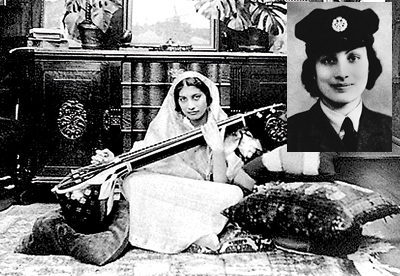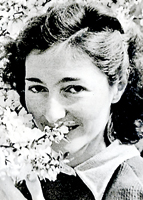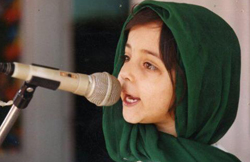Sunday Times 2
Indian Muslim princess who died for Britan
A beautiful Indian princess, she sacrificed her life for Britain as a wartime secret agent. With astonishing courage, Noor Inayat Khan evaded the Gestapo before being betrayed, tortured and, after refusing to reveal any information, executed at Dachau concentration camp.
Her last word as the firing squad raised their weapons on September 13, 1944, was ‘liberté’. Yesterday, seven decades after her death aged 30, a statue to the forgotten heroine was unveiled in London by the Princess Royal.

Noor, above and inset in uniform, had a degree in child psychology, played sitar, and wrote short stories for children
The bronze bust commemorating Britain’s only female Muslim war heroine is the first stand-alone memorial to an Asian woman in the UK. It stands in Gordon Square near the house where Noor lived and from where she left on her last mission, unable to tell her mother she might never return.
Princess Anne said stories such as Noor’s are ‘remarkable in their own right’ but have a real connection to make with the modern age through their ‘multi-cultural aspect’.
She hoped the statue will ‘remind people to ask: Who was she? Why is she here? And what can we achieve in her memory?’
Noor was part of an elite band of women in the Special Operations Executive (SOE) and the first woman radio operator to be flown into occupied France to aid the Resistance.
Born in Moscow to an Indian father and an American mother, Noor was a descendant of Tipu Sultan, the 18th century ruler of Mysore. The family lived in London, moving to Paris when Noor was six.
She studied the harp, gained a degree in child psychology and wrote children’s stories.
When Paris fell to the Nazis in 1940, she returned to London and volunteered for the Women’s Auxiliary Air Force.
Recruited by the SOE in 1942, she was sent to Paris in June 1943 with the codename Madeleine.
Many members of the network were soon arrested, but Noor chose to remain in France, trying to send messages back to London while avoiding capture.
That October she was betrayed by a Frenchwoman and arrested by the Gestapo. She was kept in chains and in solitary confinement. Her captors kicked and interrogated her but she revealed nothing.
When posthumously awarded the George Cross, Britain’s highest civilian decoration, for her gallantry in 1949, the citation read: ‘She refused to abandon what had become the principal and most dangerous post in France, although given the opportunity to return to England, because she did not wish to leave her French comrades without communications.’
Noor was one of only three women in the SOE to be awarded the medal. The other two – Violette Szabo and Odette Hallowes – have been more widely known and celebrated until now. Campaigners spent years raising £60,000 for Noor’s statue, by London-based artist Karen Newman, from public donations and enlisted the support of politicians including David Cameron, who said it was ‘impossible not to be moved’ by her bravery.
Shrabani Basu who wrote a biography of Noor in 2006 called ‘Spy Princess’ and spearheaded the campaign to get her formally recognised, said: ‘I realised how much Noor’s story had touched ordinary people, especially the young.
‘I felt it was all the more important to remember Noor’s message, her ideals and her courage in the troubled times we live in.’
Noor’s brother Hidayat Inayat Khan, 95, was unable to travel from his home in The Hague, Netherlands, to attend the ceremony due to old age but said in a message read by his grandson Omar:
‘May the inhuman suffering of all those – who like my dear sister perished under the brutal cruelty of the oppressor – not be in vain.’
Her cousin Mahmood Khan Youskine, 84, who spent holidays with her in France as a child, did make it and said: ‘I remember her as a very refined girl who believed in freedom as a spiritual condition.
‘Later I think she decided freedom had to be a political and social experience too. ‘Sometimes it can take time to gain clarity on the past, but I appreciate it enormously that she is now being given recognition in the heart of London.’
Veterans of both the SOE and WAAF including Irene Warner, 91, who trained with Noor, were among the 300 throng.
She remembered her as ‘quiet and shy but very nice’ and said she ‘certainly deserves recognition’. General Sir David Richards, the Chief of Defence Staff, said in a message in the programme: ‘We owe our freedom to women like Noor Inayat Khan.’ After the unveiling, a bugler played the Last Post before a minute’s silence was observed. Noor was also posthumously awarded France’s Croix se Guerre after the war. A film of her life is planned for release next year on the centenary of her birth.
© Daily Mail, London
Follow @timesonlinelk
comments powered by Disqus























